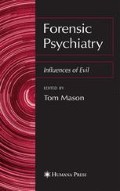Abstract
Culpable intent has been a central element of mens rea in systems of criminal law since early times, but absence of culpable intent has not featured explicitly in most insanity tests since the time of McNaughtan. Most tests since then have been based on two other traditional elements of excuse: ignorance and compulsion (or duress). This chapter briefly reviews the background of this development and the reasons why absence of intent has not figured more prominently as an excusive factor in insanity defenses. Given the character of the offenses, the presence of criminal intent often seems indefeasible. It is argued that although many intentions may appear to be present, it is far from evident that those intentions or reasons that do have an efficacious or motivating role in the defendant’s actions, those reasons for which and those intentions with which the agent actually acted, are in fact criminal. For many relevant cases there is indeed intention that can account for the appearances and characteristics of intentionality in the defendant’s actions, but the efficacious intention is unconscious and nonculpable, and therefore not criminal-both because it is unconscious and because, in most cases, it is not a culpable intention. If the argument can be sustained, then the emphasis in determining absence of mens rea in some cases of insanity should shift from what the agent didn’t know or was (internally) compelled to do to what he intended; a position that seems more aligned with procedure in the ascertainment of legal responsibility elsewhere in the law.
Access this chapter
Tax calculation will be finalised at checkout
Purchases are for personal use only
Preview
Unable to display preview. Download preview PDF.
References
Fingarette, H (1972) The Meaning of Criminal Insanity. University of California Press, Santa Cruz, CA.
Moore, M.S. (1984) Law and Psychiatry. Cambridge University Press, Cambridge.
Robinson, D.N. (1998) Wild Beasts and Idle Humours: The Insanity Defense from Antiquity to the Present. Harvard University Press, Boston, MA.
Kelly, J.M. (1992) A Short History of Western Legal Theory. Oxford University Press, Oxford, UK.
Moran, R. (1981) Knowing Right from Wrong: The Insanity Defense of Daniel McNaughtan. The Free Press, New York, NY.
Freud, S. (1974) Introductory Lectures on Psychoanalysis. Penguin, Harmondsworth, UK.
Author information
Authors and Affiliations
Editor information
Editors and Affiliations
Rights and permissions
Copyright information
© 2006 Humana Press Inc.
About this chapter
Cite this chapter
Pataki, T. (2006). Intention, Excuse, and Insanity. In: Mason, T. (eds) Forensic Psychiatry. Humana Press. https://doi.org/10.1007/978-1-59745-006-5_4
Download citation
DOI: https://doi.org/10.1007/978-1-59745-006-5_4
Publisher Name: Humana Press
Print ISBN: 978-1-58829-449-4
Online ISBN: 978-1-59745-006-5
eBook Packages: MedicineMedicine (R0)

